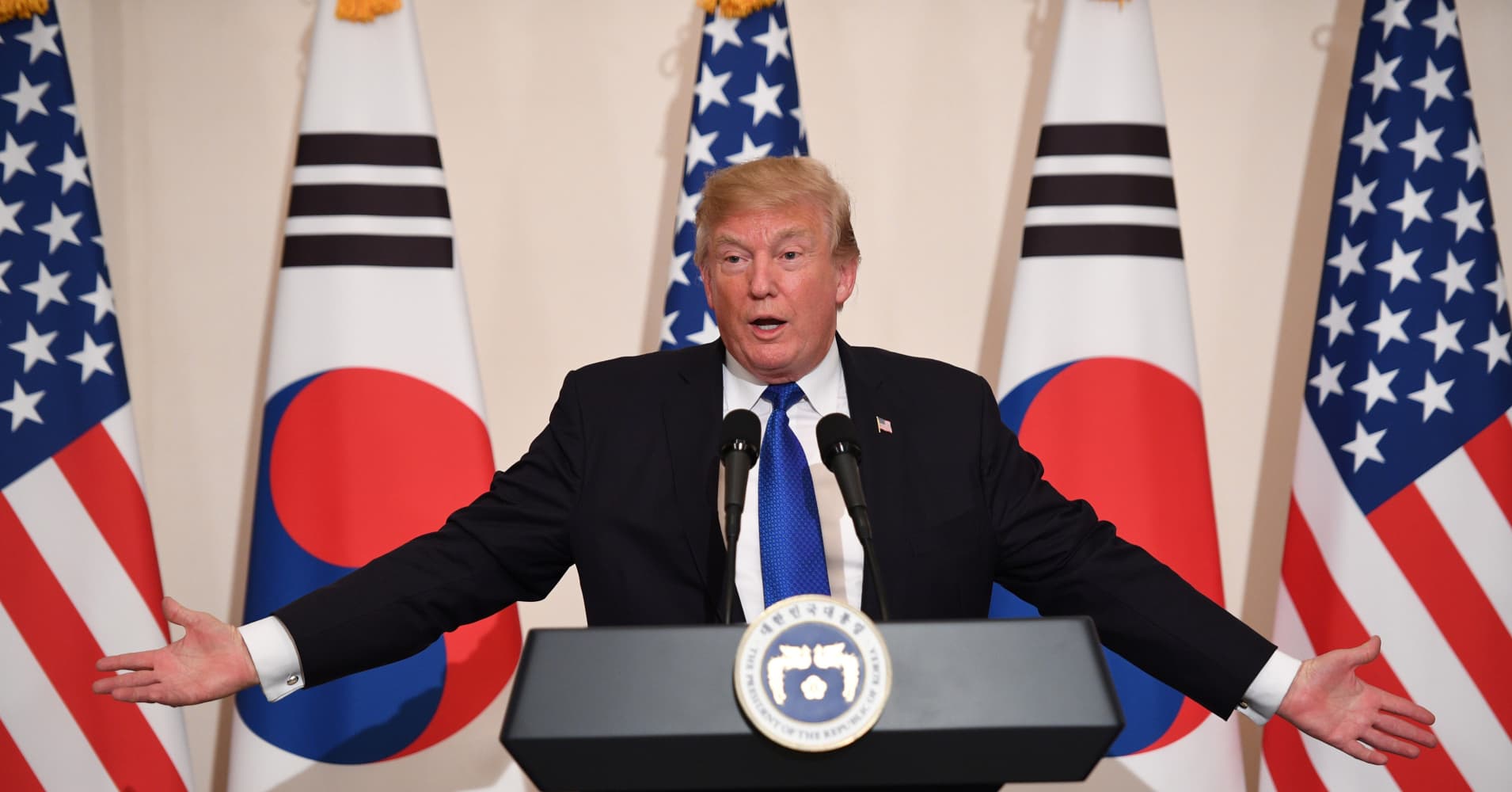U.S.-South Korea Trade Deal: Tariffs Set at 15% for Seoul
- This agreement indicates that tariffs will be reduced from the 25% that Trump had warned about in his "tariff letter" addressed to Seoul earlier this month.
- South Korea will "provide the United States with $350 billion for investments that are owned and operated by American entities," Trump stated.
- The agreement in Seoul aligns closely with a previous arrangement between the U.S. and Japan.

U.S. President Donald Trump stated on Wednesday that Washington has finalized a "Full and Complete" trade agreement with South Korea, imposing general tariffs of 15% on the nation's imports into the U.S.
This agreement signifies that tariffs will decrease from the 25% that Trump previously warned about in his "tariff letter" addressed to Seoul earlier this month. Additionally, tariffs on the nation's automotive imports, currently at 25%, will be reduced to 15%.
In a recent message posted on the social media site Truth Social, Trump stated that South Korea "will provide the United States with $350 billion for investments managed and directed by the U.S., and chosen by me during my presidency."
It seemed there was a variation in understanding between Seoul and Washington regarding the use of that sum.
In a Facebook post, South Korea's President Lee Jae-myung announced that his nation has "completed tariff discussions" with the United States, stating that the $350 billion fund will help support the expansion of Korean businesses into the U.S. market within sectors where they excel, including shipbuilding, semiconductors, second-generation batteries, biotech, and energy, based on an English version of his remarks originally written in Korean.
He mentioned that $150 billion from this funding will go toward "cooperation in shipbuilding, offering significant assistance to South Korean firms looking to enter the U.S. shipbuilding sector," and he noted that "it's crucial to attain win-win results rather than solely seeking one-sided advantages."
In responses following the announcement of the agreement, Louise Loo, who leads Asia economic analysis at consulting company Oxford Economics, stated that the figures released thus far "provide little additional insight—similar to the arrangements the U.S. has made with other Asian partners."
U.S. Commerce Secretary Howard Lutnick stated that "90% of the profits" from the $350 billion investment would "benefit the American public." This mirrors Trump's previous declaration regarding Japan’s investment in the U.S., which was included in a trade agreement finalized earlier this month and has since faced opposition from Tokyo.
The Japanese government stated on Friday that earnings from a $550 billion investment outlined in the trade agreement with the United States would be shared between both nations depending on how much each contributed, as reported by Reuters.
Wendy Cutler, senior vice president at the Asia Society Policy Institute and formerly the Deputy U.S. Trade Representative, stated in a message that "After a U.S. trade agreement was finalized with Japan, South Korean officials had limited options but to strive diligently to finalize their own trade deal in order to avoid being put at a disadvantage in the U.S. marketplace."
Although Seoul was unable to secure any compromises regarding steel and semiconductors, she pointed out that it had effectively held off U.S. pressure to expand access to its beef and rice markets, which Cutler refers to as "two very delicate areas."
More investments
On Wednesday, Trump further stated that as part of the agreement, Seoul would buy $100 billion worth of liquefied natural gas or additional energy supplies from the U.S., noting that Seoul had also committed to investing "a significant amount of funds for their investment needs."
The amount will be revealed when Lee travels to Washington for a bilateral meeting in the coming fortnight, he mentioned.
U.S. products will not face any taxes, according to Trump. By 2024, South Korea's actual tariff rate on imports coming from the U.S. was about 0.79% .
ASPI's Cutler stated that the new deal "undermines the significance of our bilateral FTA, as the U.S. and South Korea removed nearly all of their tariffs. As an FTA member, South Korea appears unfortunately not to have been granted any particular benefits." Seoul has maintained a free trade agreement with the U.S. since 2012.
The value of U.S. merchandise trade with South Korea reached just above $197 billion in 2024, as reported by the U.S. government, with a trade gap of $66.0 billion during the same period, representing an increase of 29.2% compared to the previous year.
In his statement, Lee expressed, "I hope that this will help strengthen industrial collaboration between South Korea and the U.S., as well as enhance the alliance between our two countries," while emphasizing that Seoul will continue to prioritize "diplomacy focused on national interests."
South Korea will "not receive treatment any less favorable than other nations when it comes to semiconductors and pharmaceuticals." Steel, aluminum, and copper are excluded from these changes and continue as they are, according to Lutnick. Exports of steel, aluminum, and copper to the U.S., regardless of origin, are subject to 50% tariffs.
Oxford's Loo mentioned that South Korea imposing a 15% tax on vehicles similar to Japan "might be viewed as a benefit for President Lee [Jae Myung]." However, she warned that taxes on electronic goods and semiconductors might still increase.
The South Korean Kospi index rose 0.5% following the statement, whereas the yield on its 10-year government bonds increased slightly.

Posting Komentar untuk "U.S.-South Korea Trade Deal: Tariffs Set at 15% for Seoul"
Please Leave a wise comment, Thank you